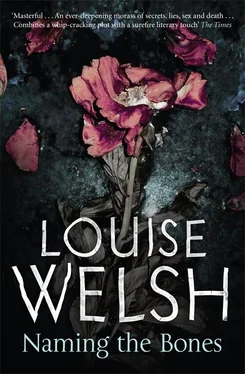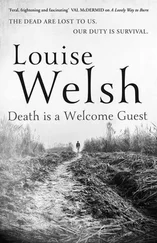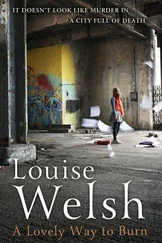Murray had never been that interested in cars. It had been Jack who’d sat in deep communion with packs of Top Trumps cards, memorising makes and models, comparing maximum speeds and fantasising about what he would drive when he grew up. But Murray should have recognised the black Saab parked outside Christie’s cottage. The car was stamped on his memory. The smooth swiftness as it overtook Rachel’s BMW by the reservoir on the way home from their country park tryst. He remembered Rachel clambering onto his knee, unbuttoning her blouse, his shock as she flicked on the car’s interior light, the brilliant shine of white lace before he clicked it off, the dark shadow of the other car.
He said, ‘Don’t you mind? Sharing her with strangers?’
The professor’s voice was compassionate.
‘With strangers, no. It’s part of what binds us together.’
Murray nodded, as if he understood.
‘Did you email me the photographs?’
Fergus’s smile was saintly, a gentle shepherd caring for one of his flock.
‘I thought they might help you get over her, and I knew I could rely on your discretion.’
Murray raised his eyes towards the sloped roof. He saw a trickle of water trailing down the stone wall, following the uneven surface of the rock, forging its path along the lines of least resistance. He said, ‘I’ll get Pete Preston to give me a lift in his tractor.’
‘As you wish. Make sure you get back to Glasgow, where you can be safe and dry. The islands can be unhealthy for us city-dwellers.’
‘Was Lismore unhealthy for Archie?’
‘He died here. I thought you knew that.’
It was a bad joke, all of it. He’d thought all his curiosity was gone, but Murray found himself asking, ‘Fergus, what was Archie like when you knew him?’
The older man paused by the door and looked at the room as if wanting to commit its details to memory. He hesitated. For a moment Murray thought he was going to refuse to answer, but then he started to speak and his voice was low and measured.
‘Archie was scruffy, with a poor sense of hygiene and a tendency to drunkenness. He was slow to anger when he was sober and fast with his fists when he was in his cups, which, as I said, was much of the time. He liked women, but even after he met Christie he was convinced they didn’t like him.’ Fergus paused as if considering what he was going to say next, then went on, ‘But there was no real edge to Archie Lunan, never any sense of suspicion. If he liked you, he liked you, no judgement attached. He’s the only person I ever met to whom I’d apply the phrase, “too good for this world”. He would have made a wonderful father, if he’d managed to turn his back on alcohol.’ Fergus levelled his gaze to Murray’s. ‘Do you know what the main problem with Archie was?’
‘No, tell me.’
‘He thought everyone was as good and as loyal as he was, and of course they weren’t.’
He gave his inverted smile again, but this time his face looked old and worn and inclined to tears.
MRS DUNN’S PRIVATE sitting room was warm. Murray leaned back in the tasselled easy chair he suspected had once been the preserve of long-dead Mr Dunn and bit into a fruit scone spread with the home-made jam. Archie the cat was basking in front of the electric fire. He peered at Murray through glazed eyes, then lowered his head back onto the carpet and slid into sleep.
‘Not impressed?’ Murray leaned down and ruffled the creature’s furry chest. ‘I’ll add you to the list.’ He sat back, marvelling at the cat’s talent for relaxing. Was Archie neutered? Maybe that was the way to be content, sever all desires.
He had meant it when he told Fergus that he was through with the book. Even now, settled in the warmth of Mrs Dunn’s front room, waiting to hear her story, he was sure he would never write it. But he had left it too late to cancel his visit and the tea and home-baked spread conferred an obligation. Murray glanced at his mobile resting on the occasional table beside him. Mrs Dunn had allowed him to charge it and the small bars on the display pulsed as the battery filled with energy.
He’d had no idea how hungry he’d been, but the landlady’s baking had awakened an appetite in Murray as fathomless as a small boy’s at a Sunday School picnic. He realised he was eyeing a plate of pancakes, even as he chewed on what remained of his scone.
Mrs Dunn settled her broad backside into the armchair opposite and freshened their cups with tea from the large pot on the table between them.
‘Help yourself, Dr Watson. They’ll go to waste otherwise.’
Murray doubted the archaeologists who had taken his berth would let cake go stale, but he filled his plate and asked, ‘How did you know I wasn’t a walker?’
Mrs Dunn took a bite from a slab of iced gingerbread and brushed the crumbs delicately from the solid shelf of her bosom.
‘I’m not sure I would know now. You’ve turned into a bit of a mountain man. But when you arrived your clothes were too new and you didn’t ask any questions about the walking. Even the ones that have been here before want to know what the ground’s like or if there are any bulls in the fields.’ She looked down at her bulk and picked another fragment of icing from her blouse. ‘I don’t know why they ask me. It’s plain I’m not much of a walker these days.’
‘But you used to be?’
‘Oh, yes.’ Mrs Dunn nodded towards the wedding photograph on the sideboard. ‘When I first came here, I could trek with the best of them.’
Murray followed her gaze and saw a thin man in naval uniform arm-in-arm with a slim, young bride.
‘You made a lovely couple.’
‘I’m not being conceited when I agree with you.’ She smiled. Murray searched her face for the girl in the picture, and failed to find her. Maybe Mrs Dunn guessed what he was thinking because she added, ‘I sometimes find it hard to believe it was us.’
‘Were you married on the island?’
‘Along the road at St Mungo’s.’
‘But you weren’t born here?’
‘I would have thought that was obvious from my accent. I’m a Glasgow girl, didn’t settle here until after we were married in 1970.’
‘So you were here when Christie and Archie arrived.’
Mrs Dunn took a sip of her tea.
‘Yes.’
He waited for her to go on, but she rested her cup on its saucer and began to tell him about a granddaughter studying archaeology in Dundee. Murray worked through the contents of his plate and tried to nod in the right places.
Murray had told the landlady about his biography of Lunan while they drank their first pot, now they were on their second and he was still no wiser. It didn’t matter. None of it mattered. He sipped his tea, hoping the caffeine would do its job and keep him awake.
‘There’s a few of the young ones gone in for it.’ Mrs Dunn was well under way. ‘They get school visits from the archaeologists when they’re here and then there’s always a need for free labour on the digs, so they get involved and some of them get hooked, like Kirsty. Of course, there’s no guarantee she’ll stick with it, but a degree’s a degree. She can always do something else.’ The old lady beamed. ‘We never used to bother about the old monuments much when we were young. It’s terrible to think on it now, but there were still crofters who took the boulders from the walls of the broch or the old castle to shore up their own dykes, and more than one who knocked down standing stones to make the ploughing faster. No one thought anything of it.’
Murray thought he could detect a faint, bitter scent of singeing fur, but the cat remained motionless on the rug. He said, ‘Things must have changed a lot over the years.’
Читать дальше












